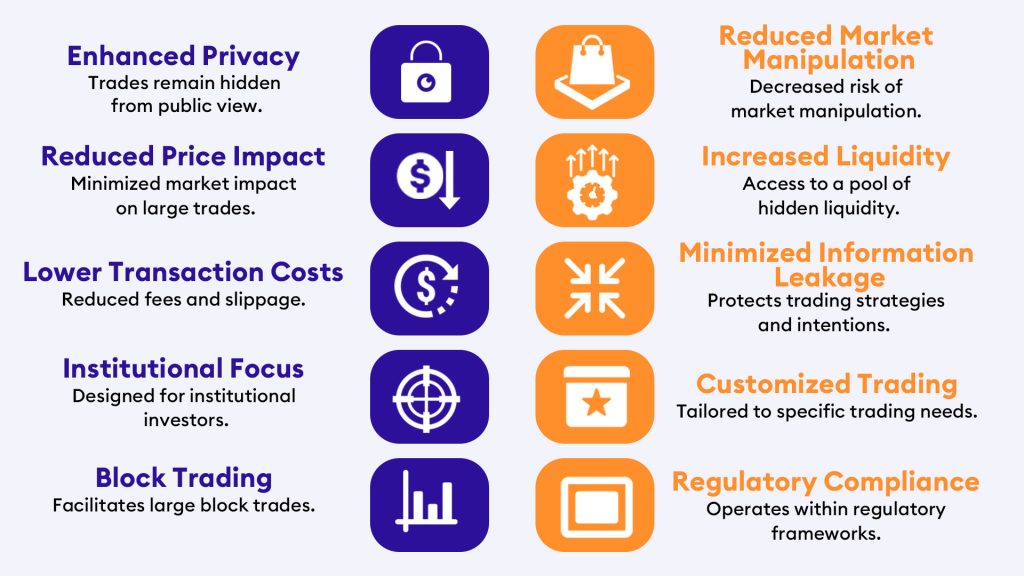Dark pools are private financial markets where large-scale investors conduct trading. Unlike public exchanges, dark pools allow traders to execute transactions without revealing their actions immediately to the broader market.
Dark pools serve as an essential component of alternative trading systems (ATS). They offer a platform for traders to carry out significant transactions discreetly, without the immediate impact on stock prices or drawing undue attention. Understanding dark pools’ functioning and significance is crucial for grasping the complexities of today’s trading landscape.
Types of Dark Pools
Dark pools (private trading venues with limited market visibility) come in various forms.
- Broker-Dealer-Owned Dark Pool: Set up by large broker-dealers, these pools serve clients and proprietary traders, deriving prices from order flow and allowing for some price discovery. Examples: Credit Suisse CrossFinder, Sigma X (Goldman Sachs), Citi-Match (Citibank), and MS Pool (Morgan Stanley).
- Agency Broker or Exchange-Owned Dark Pool: These dark pools act as agents, not principals, and derive prices from exchanges like NBBO midpoint, lacking price discovery. Examples: Instinet, Liquidnet, ITG Posit, BATS Trading, and NYSE Euronext.
- Electronic Market Maker Dark Pools: Independent operators like Getco and Knight run these pools, acting as principals for their accounts. They offer price discovery separate from the NBBO.
Advantages of Dark Pools
Over the years, dark pools have expanded beyond their original purpose, drawing in a broader range of market participants. Electronic trading platforms and favorable regulatory changes have contributed to the growth of dark pools, making them more accessible to various types of traders and investors. As a consequence, dark pools have experienced an increase in usage and popularity.

Risks of Manipulation and Lack of Transparency
In this world of Blackpools, we also encounter some concerning aspects.
Firstly, their lack of transparency raises eyebrows as they operate with little oversight and minimal regulations compared to public exchanges. This opacity invites scrutiny and questions their adherence to regulatory measures.
Secondly, unfair advantages emerge, primarily associated with High-Frequency Trading (HFT). Certain investors gain an edge that remains elusive to others, especially within the confines of private exchanges. Such discrepancies stir debates on the equity of the financial playing field.
Furthermore, potential conflicts of interest and unethical investment practices are hidden within these murky waters. These secretive elements add a sense of caution when navigating the world of black pools. These Pools, while not inherently illegal, have faced their share of scrutiny due to instances of market manipulation and lack of transparency.
Operators such as Credit Suisse and Barclay’s Capital have been fined millions for unethical trades against their clients. 1
Critics argue that dark pools, with their inherent conflict of interest, need stricter regulation. Alternative Trading Systems (ATS), governed by fewer rules than stock exchanges, are also prone to violations, such as trading against customer orders or exploiting confidential information.
Lack of transparency remains a major concern, with allegations of illegal front-running in dark pools. The SEC is continuously implementing regulations to monitor and curb these practices, aiming to restore trust and integrity to the financial markets. 2
Impact of Dark Pools on the Stock Market
Dark pools play a significant role in influencing stock prices. These private trading platforms obscure large trades from the open market, reducing volatility.
Selling large blocks of shares on public exchanges decreases stock prices due to increased supply. These pools allow institutional investors to trade large volumes discreetly, preventing widespread market impact. With electronic trading intensifying price changes, dark pools provide a solution to price volatility. By privately selling bulk stock and later revealing the sales, companies can achieve better execution prices, minimizing risk and yielding higher returns for investors. Overall, dark pools offer a more controlled approach to trading large orders.
Recent regulatory efforts have highlighted concerns over these pools. However, it should be understood that their impact on market quality cannot be seen in black and white. The context matters, and a careful approach is needed to balance investor protection with liquidity and efficiency. The ‘dark’ pool might hold the light we need. 3
- Theguardian: https://www.theguardian.com[↩]
- Investopedia: https://www.investopedia.com[↩]
- Web forum: https://www.weforum.org[↩]


